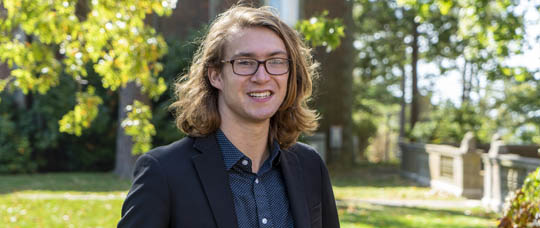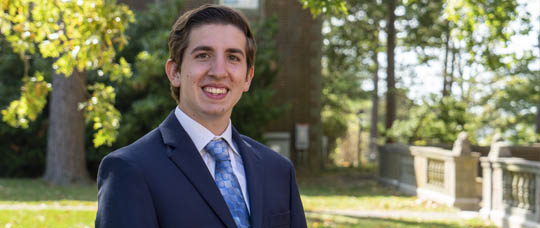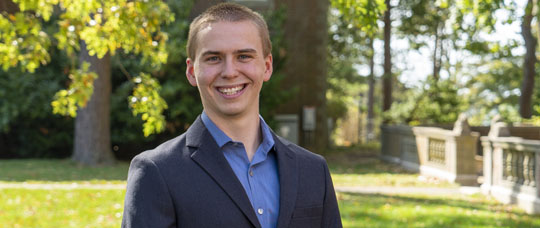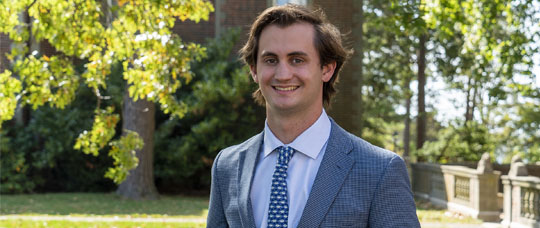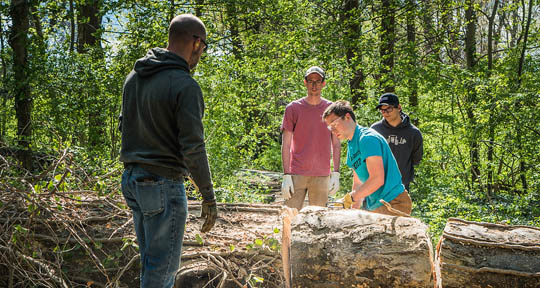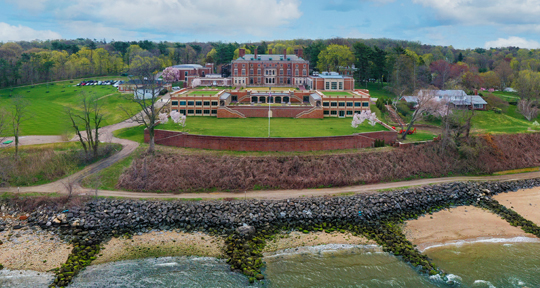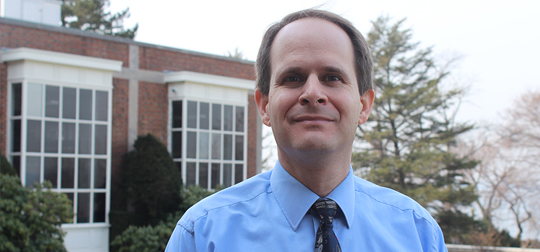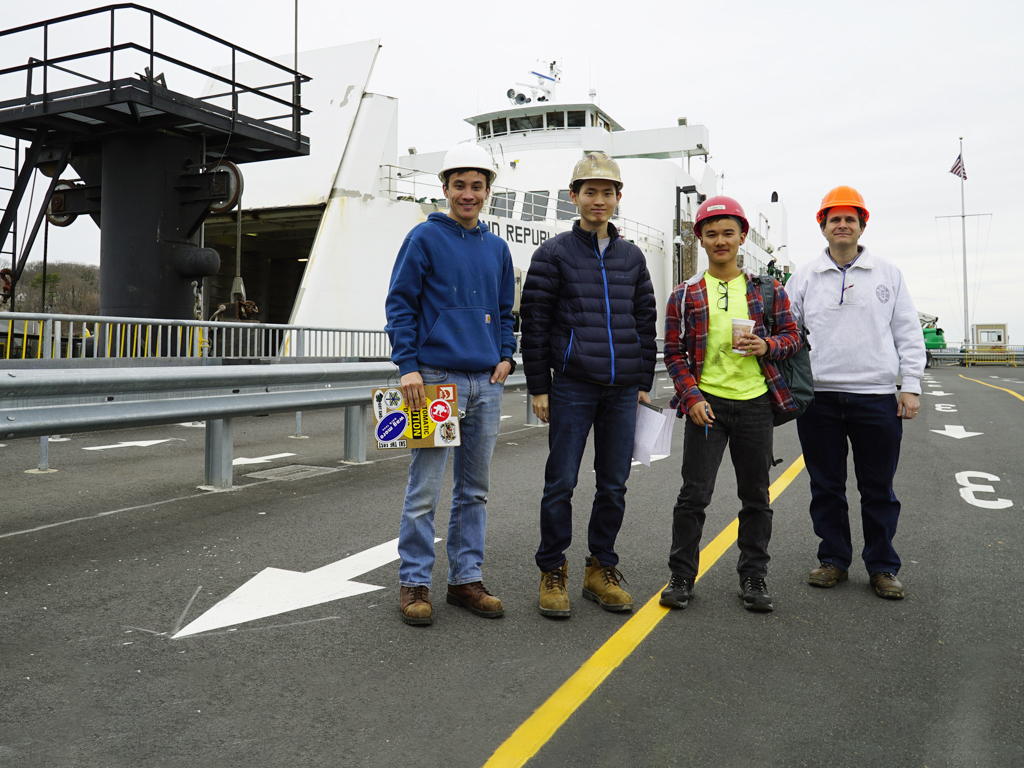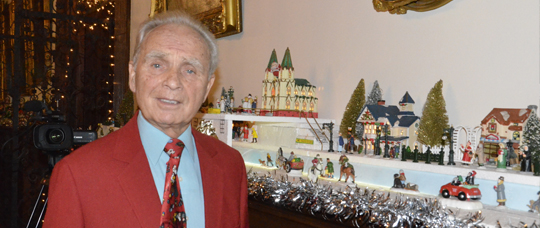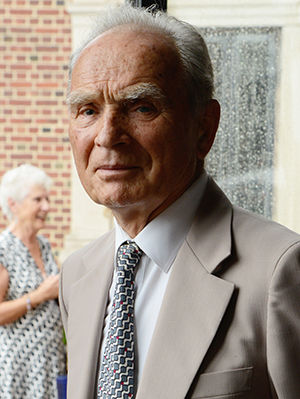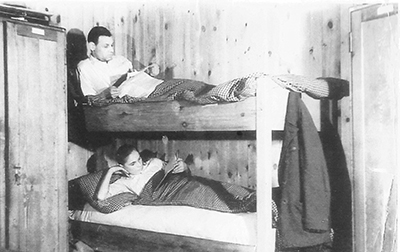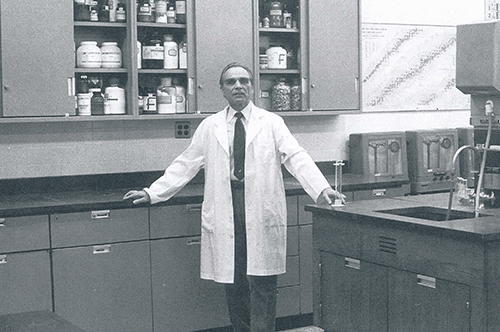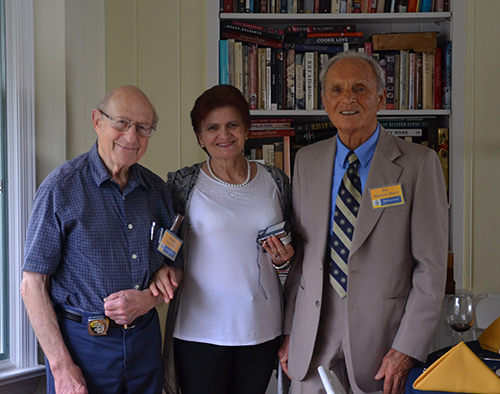Hometown: Wakefield, RI
Thesis Title: The Viability of Compressed Natural Gas as Fuel: The Installation and Emissions Testing of a Dual-Fuel System for an Electronically-Timed, High-Speed Diesel
Post Graduate Plans: Working at Northern Shipping Funds in Stamford, CT
What was your favorite Winter Work internship?
Sea term aboard the M/V Yorktown Express.
Do you have any advice for incoming students?
Webb is truly what you make of it.
What will you miss the most about Webb?
I will miss the people of Webb.
What’s your favorite spot on campus and why?
On certain late nights, I would hang out in the auditorium and write music. This was also a place I could be alone and reflect.
What activities were you involved with at Webb?
Jazz band, Woofs, Basketball, Soccer, Tennis, and lots of shenanigans.
Senior Spotlight: Daniel Desio ’21
Hometown: Marietta, Georgia
Thesis Title: Airport Ferries: A Feasibility Analysis and Concept Design of a New York Airport Ferry
Post Graduate Plans: NSWC Carderock, Combatant Craft Division
What activities were you involved with at Webb?
Sports-Related: Soccer, Tennis, Basketball, Volleyball, Disc Golf, and Ultimate
Music Related: Jazz Band, Webbstock Band, and WooFS
Miscellaneous: Anchor Club and Wakeboarding
What will you miss the most about Webb?
I am going to miss all the late-night shenanigans while doing work, spending time with all my classmates, and the closeness of all the friends I gained. I love the sense of community and the family atmosphere and I will be sad to see it go.
Do you have any advice for incoming students?
You have more time than you think. Yes, there is a good amount of work that you have to do, but if you prioritize having fun and doing spontaneous activities with friends, the work will get done. It is okay to be a late-night crew because it’s only four years so make sure to make all the memories you can.
What’s your favorite spot on campus and why?
I really enjoy the pub because it is a great space to hang out and spend time with other classes. One of my favorite memories of hanging out in the pub was going in and talking to the seniors when they were working on SD and getting sponsored during games. I learned and honed my pool skills while at Webb too.
What has been your greatest challenge?
My greatest challenge is my fear of failure. I often second guess my decisions or base what I do on what has the highest likelihood of success. It hinders me when I choose not to do something because I am scared I might fail, so I will just do what makes me comfortable, even if it is not what might bring about the best future or teach me new things.
Senior Profile: Ian Cosic ’21
Hometown: Simi Valley, CA
Thesis Title: USCGC Lilac Renovation: Developing a Plan to Carry Passengers on a Historic Lighthouse Tender
Post Graduate Plans: Naval Architect at Elliott Bay Design Group
Favorite Quote.
“Never Give In.” – Winston Churchill
What was your favorite Winter Work internship?
Sea Term. The opportunity to really be out there, at the mercy of the sea, with only the engineering of your ship and the diligence of its crew keeping you alive is a formative experience for a young engineer.
Who was your favorite mentor at Webb and why?
Professor Gallagher. Every time he steps into the classroom (or machine shop) you can tell that he has loved his career. He’s incredible at what he does because he finds enjoyment in it, and that enthusiasm is contagious.
What have you learned from other students?
Humility. There’s always somebody smarter, faster, and harder working than you are, and being around those people is a constant reminder that every day presents a choice as to how we may live it.
What’s your favorite spot on campus and why?
The Long Island Sound on a warm summer day with a 15-knot breeze on the starboard bow. That’s when I feel the freest.
Senior Profile: Jack Becker ’21
Hometown: Manhasset, NY
Thesis Title: The Effect of Shape Change on the Added Mass Generated by an Axisymmetric Body
Post Graduate Plans: Work at Boksa Marine Design in Tampa, FL
What will you miss the most about Webb?
I will miss my classmates and the friends I have made during my time at Webb.
What’s your favorite spot on campus and why?
The yacht club is my favorite spot on campus. The ability to get out on the water or hang out on the beach after classes are the best way to enjoy a nice summer day.
Why did you choose Webb?
I chose Webb because of my love for the water and its academic rigor. After growing up with a boat on the Long Island Sound, I knew that I would like to design boats in my future. And through Webb’s academic rigor, I have gained a strong foundation in Naval Architecture and Marine Engineering that I am looking forward to using throughout my career.
SD1 Projects: USCGC Skadi
Designers: Anika Breza, Rudy Caligure, Luke Kiely, and Rebecca Teitelbaum
Vessel Type: Polar Icebreaker
Vessel Mission:
The USCGC Skadi will support the U.S. Coast Guard’s missions in polar waters. It will have Search and Rescue capability, provide resupply to remote stations, and facilitate safe navigation through waterway maintenance and ship escort. It will also support law enforcement, scientific research, and environmental protection response.
Vessel Route:
This Vessel will navigate polar waters including the Chukchi and Beaufort Seas in the Arctic and McMurdo Sound in Antarctica at any time of year.
Icebreaking Requirements:
Skadi must break 2.5m of ice topped with 150mm of snow continuously at 3kts, corresponding with Polar Clas 2. She will be able to break ice ridges greater than 8m.
View Presentation
Visit our Junior Class Small Vessel Design Project page to view all of this year’s projects.
About Junior Class Small Vessel Design Project (SD1):
As a part of Professor Bradley D.M. Golden’s ’99 Ship Design 1 (SD1) class, the juniors spent the first two-and-a-half months of the spring semester preparing their first complete concept designs.
Using the knowledge they’ve gained in their nearly three years studying at Webb and the experiences from their winter work periods to date, this was the students’ first opportunity to apply the naval architecture and marine engineering principles they’ve studied including stability, ship’s structures, main machinery systems, auxiliary systems, resistance and propulsion, and electrical engineering.
Working in small groups of three and four, the students selected one of the vessel types and took their first couple of spins around the design spiral to prepare vessel concept designs. To help make the project as realistic as possible, members of industry familiar with each of the vessel types helped prepare the statements of design requirements that each of the designs had to meet. To challenge the students even further, one or two “curveballs” were thrown into each design statement to make the students think long and hard about how they would achieve their objectives.
At the end of the spring semester, the students presented their final designs to their fellow students, faculty, and members of industry who served as part of an evaluation team. After three years at Webb, the Junior class can now say with confidence that they’re familiar with the design process and are well on their way to joining the fields of naval architecture and marine engineering.
Webb students give Welwyn Preserve much-needed TLC
By Jill Nossa
Read the article on LIHerald.com
Welwyn Preserve, on Crescent Beach Road, was once a little-known gem in Glen Cove, a place many enjoyed for the solitude of a quiet hike on a trail or down to the shore of Long Island Sound. But what previously attracted few became a destination for many over the past year, as people searched for outdoor activities. The influx of visitors, combined with a year of heavy winds, left the preserve in dire need of cleaning up.
Last Friday, dozens of students from the Webb Institute volunteered to do just that. “It’s been a little abandoned, and we have thousands of people coming through on the weekends now,” Jolanta Zamecka, president of Friends of Welwyn Preserve, said. “Welwyn is such an important preserve to this community, and people have discovered Welwyn and its fantastic trails.”
Webb students Luke Herbermann and Jackson Juska helped organize the volunteer effort after contacting Zamecka earlier this spring. “We had a Welwyn cleanup two years ago, mostly picking up trash, and thought it would be better this year to reach out,” Herbermann, 22, explained. “We wanted to make it a big deal because it had kind of died out last year.”
He and Juska encouraged other students to get involved, Herbermann said, and a crew of about 75 spent a few hours on Friday afternoon clearing branches, removing trash and painting.
The Webb Institute, a naval architecture and marine engineering college, is adjacent to the preserve, and students spend a lot of time walking the trails, Herbermann said. Some, like Hank Roland, also enjoy bird watching several times a week.
“Welwyn is a phenomenal place to go bird watching, because there’s a lot of variety,” Roland said. “The whole preserve is excellent, with all of the different habitats, open grass, greenhouses, and really gorgeous woods and creeks. There’s so much space.”
Cleaning it up not only benefits the birds, he said, but “makes it generally nicer for everyone in the park, for people who are coming in and enjoying the preserve.” Roland said he was happy to volunteer for the cleanup, and added, “I love this kind of work. I love being outdoors.”
Zamecka said that Webb students have been volunteering for many years, but this was the largest group she’s seen. In addition to clearing the trails, she said, they planned to mark the trails with tags instead of spray paint.
Zamecka is also vice chairman of the Holocaust Memorial & Tolerance Center of Nassau County, which shares the property, and created the Children’s Memorial Garden 21 years ago. The one-acre garden has recently undergone renovations, including the construction of an amphitheater for outdoor workshops and the installation of memorial stanchions, completed in 2019.
Bob Praver, 95, vice chairman of the memorial garden, was on hand on Friday, overseeing the students’ progress and replenishing supplies. “He has been the engine that can,” Zamecka said. “He makes us all work.”
Several years ago, Praver recalled, he was sitting on a stone bench in the garden with his son. “We looked around, and the garden was in such terrible shape . . . the weeds were horrific,” he said. “And I said to my son, ‘You know, maybe I can do something.’ And I did.”
Praver got one person involved, who got someone else involved, “and it kind of mushroomed from there,” he said.
There were no lawns at the time in the Children’s Garden, just shrubs, and weeds had taken over. “Planting grass was the solution to the weeds, and by doing that, it opened the garden up,” Praver said. “People can picnic; children can run around.”
As chairs of the center’s Garden Committee, Praver and Zamecka are responsible for raising funds. “Most people don’t realize how expensive gardens can be,” Zamecka said. “The initial expense was about $350,000, and we needed $240,000 to $250,000 for the last phase.”
Along with planting grass, the expenses included irrigation and repairing brick work. The garden memorializes the 1.5 million Jewish children who died in the Holocaust, as well as children around the world who died in World War II. As part of its revitalization, 14 memorial stanchions were erected, displaying quotes about the Holocaust. The next projects being planned, Zamecka said, are to get the dolphin fountain working and to fix the patio.
“We’ve been very blessed,” she said, “because recently we’ve had two major donors.” The Shirley and William Fleischer Foundation contributed to the garden’s revitalization, as did Steven Dubner Landscaping.
The center also received a grant from New York state to repair the patio, Zamecka said, “But the problem is, we first have to spend the money, and we don’t have the funds.”
Currently, she said, they need $10,000 for the patio repairs. Those interested in making a donation can send a check to the Holocaust Memorial and Tolerance Center, earmarked for the Children’s Garden.
A dedication and reopening ceremony for the garden is planned for June 6. A public cleanup of Welwyn Preserve is expected to take place later this spring, at a date yet to be determined.
Webb Institute Named a Best Value College for 2021 by The Princeton Review
Webb Institute is one of the nation’s top colleges for students seeking a superb education with great career preparation and at an affordable price, according to The Princeton Review®.
The education services company named Webb as a Best Value College for 2021 in a feature the company posted at https://www.princetonreview.com/college-rankings/best-value-colleges/. The feature profiles 200 schools that The Princeton Review selected out of more than 650 institutions the company considered and surveyed for this year’s project.
Information on the Best Value Colleges for 2021 project and its seven categories of ranking lists, as well as our profiles of the selected schools, is accessible for free with registration on The Princeton Review’s website.
The Princeton Review chose its Best Value Colleges for 2021 based on data the company collected from its surveys of administrators at more than 650 colleges in 2019-20. The company also factored in data from its surveys of students attending the schools as well as PayScale.com com surveys of alumni of the schools about their starting and mid-career salaries and job satisfaction figures.
In all, The Princeton Review crunched more than 40 data points to tally ROI (Return on Investment) ratings of the colleges that determined its selection of the 200 schools for the 2021 project. Topics covered everything from academics, cost, and financial aid to graduation rates, student debt, alumni salaries, and job satisfaction.
“The schools we name as our Best Value Colleges for 2021 comprise only just over 1% of the nation’s four-year colleges,” noted Robert Franek, The Princeton Review’s editor-in-chief. “They are distinctive in their programs, size, region, and type, yet they are similar in three areas. Every school we selected offers outstanding academics, generous financial aid and/or a relatively low cost of attendance, and stellar career services. We salute Webb Institute for these exceptional offerings and recommend it highly to college applicants and parents.”
The Princeton Review lists that the starting medium salary for Webb graduates is $81,500 (according to Payscale). Webb students described the college as “THE college for Naval Architecture and a job offer is basically guaranteed after graduating.”
The Princeton Review does not rank the colleges hierarchically on a single list, from 1 to 200. Among the project’s seven categories of ranking lists, Webb earned a #5 ranking on The Princeton Review list of Most Accessible Professors.
The Princeton Review is also widely known for its college rankings in dozens of other categories, many of which are reported in its annual book, The Best 386 Colleges, published in August.
Other Princeton Review rankings and lists that Webb Institute is on:
The Best 386 Colleges
Best Northeastern
Best Value Colleges
Tuition-Free Schools
Most Accessible Professors #5
About The Princeton Review
The Princeton Review is a leading tutoring, test prep, and college admission services company. Every year, it helps millions of college- and graduate school–bound students achieve their education and career goals through online and in-person courses delivered by a network of more than 4,000 teachers and tutors, online resources, and its more than 150 print and digital books published by Penguin Random House. Its Tutor.com brand is the largest online tutoring service in the U.S. It comprises a community of thousands of tutors who have delivered more than 18 million one-to-one tutoring sessions. The Princeton Review is headquartered in New York, NY. The Princeton Review is not affiliated with Princeton University. For more information, visit PrincetonReview.com. Follow the company on Twitter @ThePrincetonRev and Instagram @theprincetonreview
Professor Bradley Golden ’99 speaks on Hoisting the sail, a supply chain podcast
Recently, our Assistant Professor of Naval Architecture, Professor Bradley Golden ’99, made a special appearance on the new podcast Hoisting the Sail, where he speaks about the current state of the U.S. maritime shipping industry.
According to Wind Support NYC, “Bradley Golden paints a picture of the maritime shipping industry in the United States today. He explains the origin and impact of the 1920 Jones Act, the transformation of the industry toward decarbonization, as well as the opportunities created by the future implementation of wind farms in the New York-New Jersey Bight. Bradley opened our eyes to the possibilities in our own backyard and gave us reasons to look to the future with hope.”
About Wind Support NYC
Wind Support NYC was founded in January 2021 to promote and support projects utilizing wind propulsion to reduce emissions for a greener commercial shipping and maritime public transportation.
We are assisting live projects on the East Coast of the United States:
- impact & feasibility studies
- project management
- business development
- marketing & communication
- legal and regulatory
- logistics support
We are producing from the Brooklyn Navy Yard Hoisting the sail, a supply chain podcast.
Our inaugural episode was aired in March, we document the decarbonization of the shipping industry with the main objective to inform professionals of the supply chain in the US that innovative, low carbon ships are coming on the market.
Hoisting the sail tells the story of innovators and professionals that use the wind to power the maritime supply chain. How can you help? It is easy:
- Listen to Hoisting the Sail on Buzzsprout
- Follow us on Twitter @windsupportnyc
- Follow on Linkedin
In Memoriam: Joseph Mazurek
We are sorry to announce the passing of Joseph Mazurek (Hon.) on March 30th, 2021. Please take a look back on Joe’s life and days at Webb by reading the following story that was written by Professor Richard Harris, the Assistant Dean and Director of Humanities, for the 2017-18 Annual Report.
This article appears on page 44-46 of the 2017-18 Annual Report.
At Webb just about everyone has heard of “Joe Maz.” Joe Mazurek: the Lab Technician, the man with the European accent, the “older guy” who always attended the spring-semester ski trips, the person who made the name signs for the faculty offices in STH, the jokester who often had a wry comment about what was going on, and the person who for many years orchestrated an elaborate Christmas display in the Visconti Reception Room. He was that staff member who was always eager to help. Probably few Webbies, however, know about Joe’s life story, which is a fascinating tale.
Most Webb Family members know that Joe came to the U.S. from Poland. His early life there was typical of the lives of many men born in Poland in 1925. His father was a mason, who later worked on bridge construction. His mother stayed at home for the most part, tending to six children, though she was also a midwife and an art teacher. According to Joe, his childhood was rather conventional until September 1, 1939, when Germany invaded Poland, thus beginning the Second World War. Throughout and after the war Poland found itself caught between two of the great powers of the time, Germany to the west and Russia/the Soviet Union to the east. Both would have a significant impact on Joe’s life.
Joe remembered vividly the news that the Germans were approaching his village outside Warsaw; first, word that they were 20 kilometers away, then only one. His first sight of the Germans was two motorcycles with side cars, both with mounted machine guns, roaring into his village. Another of his childhood memories involved the men in the village throwing their rifles down a well, so the Germans, who had overrun the area, would not find them armed and execute them. On a freezing winter night, however, Joe was lowered by rope into the well to retrieve the rifles, so they could be hidden again, buried in the local cemetery. He and two older men involved in the plot were subsequently questioned by German soldiers and an officer who ordered them to be taken away. Another German officer stepped in, however, and separated Joe from the others, telling him to run away as fast as he could. The other two men were led into the woods and shot.
From 1942 to 1945, Joe was in a German work camp outside Warsaw. The accompanying photograph, taken in 1942, when Joe was seventeen, shows him on the lower bunk of the barracks in that camp. He does not talk about the hardships, rather about how he made these years of his life into something positive. The men there were part of a force of factory workers turning out large artillery pieces. Here Joe really began to learn about industrial design and production from the experienced machinists.
Joe was always interested in the way things work. And this interest is what finally brought him to Webb, though by a rather circuitous path. When the war ended in 1945, Joe was ready to move on and learn more, and he found employment in a Polish Navy shipyard. On November 6, 1945, he was on a Polish destroyer that was rammed by a tug in a heavy fog. Joe was in the water for over an hour before being rescued. His spine and knee injuries meant that he was no longer able to work in the shipyard. Luckily, Joe renewed a friendship that he had made in the work camp, and the friend’s father was a professor at the University of Gdańsk. Joe met with the friend’s father, signed a paper (which in itself is another story), and then spent two years preparing to go to the Polytechnic University. Finishing at the Polytechnic University, Joe then earned a Master of Technology degree from the University of Warsaw, and soon after was working again in a shipyard in Gdańsk. He then worked out of Gdańsk for both the Polish Ocean Line and Polish Rescue companies.
If the German invasion of Poland had been a major influence on the Joe’s earlier years, the Soviet takeover of Poland in the post-war period determined the next years of Joe’s life. Despite his degrees in engineering and technology, Joe was assigned less important jobs and was not allowed to advance at the shipyard. The reason was simple: He would not join the Communist Party. On the one hand, he did not agree with the Soviet ideology; on the other hand, he wanted to come to America, and he knew that if he did become a member of the party, in the Cold War climate following the war, he almost certainly would be denied entrance. So, for four to five years, Joe traveled the world, teaching students on Polish naval vessels how ships worked. During that period, he earned his license as a Navy Officer-Mechanic. Then, at a port call in Holland, he decided to jump ship and try to make his way to the U.S. He had a sister who had already come to Long Island, and his wife, a doctor, was already working at a hospital in Brooklyn. For six months in Holland, he “disappeared,” avoiding attempts by the Polish shipyard and the Dutch police to find him. Finally, he fulfilled his dream of coming to America when he made it to New York on an immigrant visa and began looking for a job. Someone he met took him to J. J. Henry, but that company could not hire him because he was not a U.S. citizen and thus could not work in a shipyard involved in U.S. Navy contracts. He did, however, find employment with Todd Shipyard in Brooklyn, which fortunately for him had a general manager named Mr. Kochanczyk ’41. He had a sixteen-year career at Todd.
And then Joe’s life took another turn. One of the managers at Todd played golf with Admiral Russell Bryan who served as President of Webb Institute at the time. Before long, Joe was being shown around the Webb campus by Jacques Hadler. He decided to take a job as a Lab Technician. The year was 1983. Now thirty-five years later, Joe has returned to Poland, where he has visited old friends and made many new ones over the years.
As we look back over Joe Maz’s years at Webb, a couple of things stand out. He loved the ski trips, though he didn’t learn to ski until after he came to Webb. He also knew how to skate, although one of his most amusing stories is how he feigned not knowing how to skate, just so he could be “taught to skate” by an instructor he fancied. After treating her to lunch, the pair returned to the rink, where Joe momentarily forgot that he “didn’t know how to skate”: he made a turn that gave him away. He says she seemed even more impressed with his ruse than with the turn.
I‘m pretty sure that all of us who were at Webb between 1998 and 2008 remember that Joe ran the New York Marathon on numerous occasions, the first of which was at the age of seventy-three. The Monday after each marathon he would eat lunch in his running outfit, proudly displaying his medal. His first run would have made for a Sports Illustrated classic. Having learned that he had won an at-large lottery spot only weeks before that year’s marathon, he began training by running up to eight miles a day. (This training regimen left another eighteen miles to contend with.) His night-before, pre-run meal consisted of two cheeseburgers, a couple of gin and tonics, and polka dancing at Glen Cove’s Polish Hall. He awoke at 4 a.m. on the day of the marathon so he could arrive to Staten Island in time for the beginning of the race. He felt that he did pretty well for the first eleven miles—and then the cramps set in. He had to stop numerous times to massage his legs. One of his worst moments, even considering the pain in his legs, came when he dumped a paper cup of what he thought would be water over his head to cool off. Unfortunately, it was orange juice. A swarm of flies accompanied him to the finish line. He ran the marathon nine times between 1998 and 2008 and planned to run a tenth, but in October and November 2009, he was instead caring for a friend who was ill. That was typical of Joe.
Joe’s holiday displays have brightened the Reception Room for eighteen years! Joe says that in 2000, he spoke with President Ron Kiss ’63 about displaying decorations he owned in the Visconti Reception Room. Joe envisioned decorating the window sills in the alcove looking out over the Sound. President Kiss liked the idea, and, turning to the opposite wall adjacent to the Lenfest Gallery, he said, “Joe, you can have this whole wall.” So, Joe—of course— started looking for more decorations. He found a store on Route 110 that displayed decorations on sale and told the sales rep, “Here’s $50. Hold all of them for me. I’ll be back to pick them up.” Almost $2,000 later, Joe had the collection of most of the figures we’ve seen for the past eighteen years. He assures me that he will return to Webb during the 2019 Thanksgiving break to set up this display for the nineteenth time. He can’t stay away from Webbies for too long; they have been his “family” for years.
The story of the Christmas decorations exemplifies his energy and generosity and positive spirit. Years ago, I commended Joe for one of his many good deeds and expressed to him that it was nice to know someone so good-natured and generous. His reply to me was this: “Professor, anyone who has seen what I have seen in my life, knows why it is so important for us to be positive and good to each other.” That comment, as much as anything, probably captures and explains the Joe Maz I’ve known.
Joe’s giving spirit has made him a General Admiral level supporter of the Campaign for Webb. Through his estate and subsequent gifts, Joe has established The Joseph Mazurek Scholarship Fund, a fund that will provide need-based support for room-and-board scholarships. Also, Joe has made a generous gift to the new Academic Center that enables Webb to establish the Jacques Hadler Faculty Conference Room.

